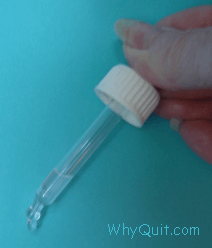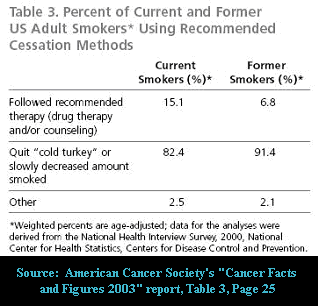
Nicotine not eedicine, its use not therapy
 We already knew that drop for drop nicotine is deadlier than arsenic, cyanide, strychnine or diamond back rattlesnake venom, that it can quickly desensitize critical brain pathways, is highly addictive and harder to beat than heroin or cocaine. Now a new April 2006 study published in the Proceedings of the National Academy of Sciences (PNAS) reports that nicotine, in any form, may prevent chemotherapy from killing lung cancer cells.
We already knew that drop for drop nicotine is deadlier than arsenic, cyanide, strychnine or diamond back rattlesnake venom, that it can quickly desensitize critical brain pathways, is highly addictive and harder to beat than heroin or cocaine. Now a new April 2006 study published in the Proceedings of the National Academy of Sciences (PNAS) reports that nicotine, in any form, may prevent chemotherapy from killing lung cancer cells.
Nicotine Prevents Lung Cancer Cells from Dying
Chemotherapy drugs Gemcitabine, Cisplatin and Taxol trigger death of cancerous cells via a process known as "apoptosis." The study shows how nicotine, via certain types of acetylcholine receptors, prevents apoptosis. One of the study's authors, Srikumar Chellappan, has been widely quoted by the AP as saying that smokers with lung cancer "should avoid nicotine in all forms, not just smoking."
Imagine being a smoker and bombarded by two decades of pharmaceutical industry nicotine replacement therapy (NRT) marketing proclaiming that replacement nicotine is the key to quitting, that it doubles your chances. Now try to imagine the catch-22 of being told your treatment battle against lung cancer probably won't be effective unless you first battle and arrest your chemical dependency upon nicotine.
Smokers whose dependency denial arsenal once included such thoughts as "anyone can quit smoking but it takes a real man to fight lung cancer" are now scrambling for new denial rationalizations.
Few dependent upon nicotine understand the scientific harm jargon. But it cannot sound good to those able to drop their denial barrier long enough to listen. According to the PANS study, "previous studies have implied that nicotine may be genotoxic, forming adducts with DNA ... thereby causing mutations in vital genes leading to neoplastic transformation." "However recent evidence has shown that nicotine can also lead to sustained activation of mitogenic pathways, promote angiogenesis, and accelerate tumor growth rates and atherosclerosis."
Words like antiapoptotic, genotoxic, angiogenesis and atherosclerosis have little meaning when the chemical you are addicted to is so captivating that despite more than 40% of smokers attempting to quit each year, roughly half of all adult smokers end up smoking themselves to death, each an average of 13 to 14 years early.
"Our findings are in agreement with clinical studies showing that patients who continue to smoke have worse survival profiles than those who quit before treatment; they also raise the possibility that nicotine supplementation for smoking cessation might reduce the response to chemotherapeutic agents," says the PANS study.
NRT Pharmaceutical Industry Has Not Been Honest
But there is growing awareness that replacement nicotine products such as the nicotine patch, gum and lozenge (nicotine supplementation) have zero value as aids to smoking cessation or nicotine cessation. Never once, in all real-world quit smoking surveys conducted to date, have those using replacement nicotine products performed better than those quitting cold turkey. Below is a sampling of facts the nicotine industry would rather those wanting to quit smoking not know:

- Almost all successful long-term quitters during 2006 will once again be cold turkey quitters (80-90%)
- Quitting resources offering a solid dependency recovery education, that enhance motivation and that offer some form of ongoing support will dramatically enhance a smoker's odds of joining more than 40 million U.S. ex-smokers who successfully quit nicotine cold turkey.
- 93% of study participants in the seven over-the-counter nicotine patch and gum studies relapsed to smoking within six months.
- Almost 100% second time nicotine patch users relapse to smoking within six months.
- 36.6% of current nicotine gum users have been dependent upon it for more than six months.
- Nicotine is a psychoactive drug producing dopamine/adrenaline intoxication. Early clinical NRT studies were not blind as claimed. The industry knew its clinical studies were not blind as early as 1982, when in the first nicotine gum studies it found itself compelled to use 1mg of nicotine as a placebo device masking agent. Amazingly, for more than two decades, it has promoted clinical results that it knew or should have known were defective and fatally flawed.
- A September 2002 study in the Journal of the American Medical Association concluded that ... "NRT appears no longer effective in increasing long-term successful cessation in California smokers."
- Real-world quitter surveys from Minnesota, London, Quebec and Maryland found zero advantage at six months for those using expensive NRT products
